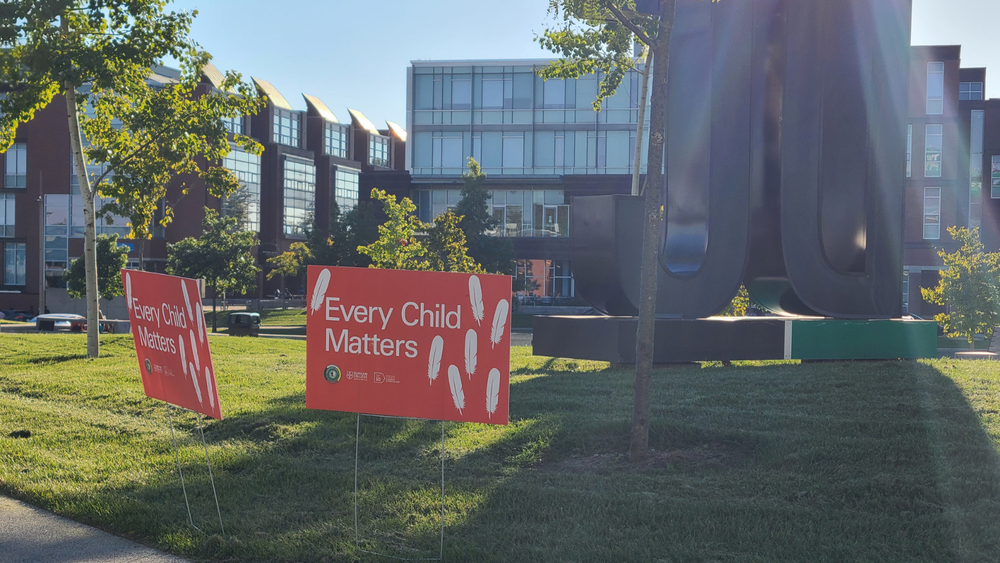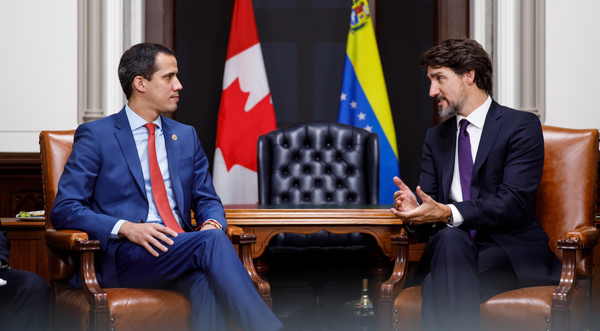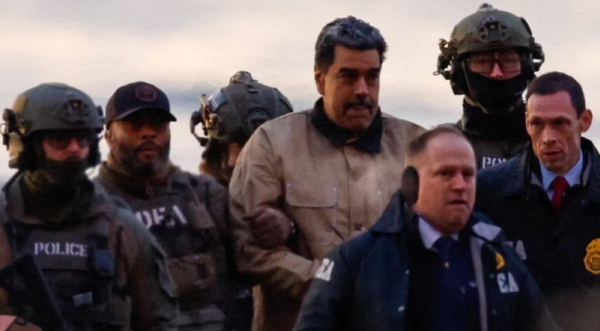ADAMS: My Reflections on Reconciliation in Canada
Two orange signs on a grassy lawn reading "Every Child Matters" with white feathers, in front of a large, dark sculpture and modern campus buildings at Durham College. Image credit: Will Adams
When so little has materially changed in the lives of Canada's Indigenous peoples, it is difficult to believe that our country is truly on a path to reconciliation. The legacy of colonialism is an ongoing reality, embedded in the systems and structures that continue to marginalize communities in the year 2025. A lack of access to safe, affordable water on reserves remains one of the most glaring examples. Former Prime Minister Justin Trudeau promised to end all boil-water advisories on reserves by 2021. That deadline has long since passed, and as of today, dozens of communities remain under long-term advisories. The fact that in 2025, people are still deprived of such a basic human right is unconscionable.
I say this not as an Indigenous MP or community leader, but as a Canadian whose own family history brushes against this story.
My father's grandmother was Indigenous, though she died long before I was born, and I never learned which nation or community she belonged to. I am technically still eligible for Indian status, though I have made the conscious decision not to pursue it. That choice feels small compared to the enormous struggles Indigenous peoples face every day, but it is a reminder of how tangled the legacy of colonialism is in this country, even for families like mine.
I was fourteen years old when I first saw the news about the mass grave discovered near the former Kamloops Indian Residential School. Like many Canadians my age, I had been taught about residential schools in elementary school, but we got the sanitized version. No graves. No children who never came home. When I saw the images and heard the truth, I felt a sickness in my stomach I had never experienced before.
My sophomore year of high school began in the fall of 2021, the first year Orange Shirt Day was formally recognized as the National Day for Truth and Reconciliation. That September, my English teacher showed us the animated film adaptation of Secret Path, Gord Downie's haunting tribute to Chanie Wenjack, a 12-year-old Anishinaabe boy who escaped from a residential school only to die alone from hypothermia in the forest decades ago. I've always admired Downie's artistry, but that day, as I watched Chanie's story, I broke down. Tears streamed across my desk, my face swollen and red. I don't often cry in public, but the weight of that history, delivered so plainly, cut through me.
Every September 30th, my mind goes back to Chanie Wenjack, to Kamloops, to the thousands of children whose lives were stolen by institutions designed not to educate them but to erase them. It is a wound that cannot simply be papered over with slogans and ceremonies.
I find it intolerable when I see parents complain online that their children are being “forced” into white guilt by learning the truth about residential schools. Their faux outrage is grotesque. Boo hoo, your child had to learn that kids their own age were beaten, starved, and in many cases killed, by a government that carried out a cultural genocide in their name. That is a part of history. To pretend otherwise is to perpetuate denial, which is becoming disturbingly mainstream.
And what of our leaders? Too many treat reconciliation as an annual performance. They wear orange shirts, post solemn words, and then retreat back to business as usual. The “Carney era” of politics is an era where reconciliation has been pushed to the sidelines. With laws like Bill C-5, Indigenous peoples have been written out of the national discussion altogether, and the political aristocracy barely blinked.
Reconciliation was supposed to mean more than this. The Truth and Reconciliation Commission gave us 94 Calls to Action in 2015, a roadmap toward something better. Nearly a decade later, fewer than 15 have been fully implemented. The ones that have are mostly symbolic. The hard work; addressing health care, child welfare, justice, education, is still sitting untouched. And while politicians drag their feet, people suffer.
It is not enough to mark Orange Shirt Day with platitudes. It is not enough to “honour the children” with hashtags and commemorative pins. Reconciliation requires dismantling the systems that continue to harm Indigenous peoples. It requires governments to face the truth, not just when headlines make it impossible to ignore, but consistently, with honesty and urgency.
For me, Orange Shirt Day is not a holiday. It is a grim reminder of what Canada owes, of what we have failed to do, and of the lives cut short by a system built on cruelty. It is also a reminder of the choice in front of us. We can continue down the path of denial, performative gestures, and broken promises. Or we can take the harder road: the one that requires real work, real sacrifice, and real change.
The future of this country will be defined by the path we choose. Reconciliation is not a gift. It is not charity. It is justice, long overdue.
This piece was written by an individual contributor and reflects the editorial position of The Provincial Times and Left Lane Media Group. Read our Content Policy here.





